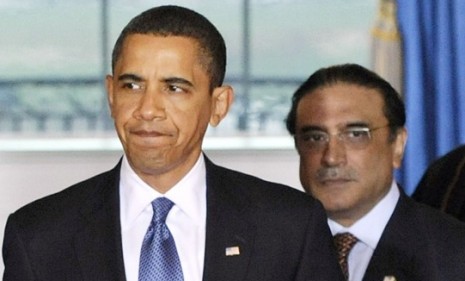4 signs of the unraveling U.S.-Pakistan relationship
In the wake of America's slaying of bin Laden on Pakistani soil, each country fails to suppress its frustration with the other

In the aftermath of last week's fatal U.S. raid on Osama bin Ladin's Pakistan compound, the already troubled ties between the Obama administration and the Pakistani government are fraying further. While President Obama has suggested he didn't give Pakistan advance warning for fear an insider would tip off bin Laden, Pakistan's Prime Minister Yousaf Raza Gilani has denounced the raid as a violation of Pakistani sovereignty. Here, four more indications that the testy relationship between the U.S. and Pakistan is nearing the breaking point:
1. Obama thought Americans might have to fight Pakistanis
President Obama insisted on increasing the size of the assault force sent to get Osama bin Laden, so the Navy SEALs would have enough firepower to fight their way out if Pakistani police or soldiers intervened. They went in with 79 commandos in four helicopters. "If the Pakistanis showed up and started shooting, our guys were going to liquidate them and then fly out," says Ed Morrissey at Hot Air. "Which, really, is all you need to know about the state of relations between the two countries these days."
The Week
Escape your echo chamber. Get the facts behind the news, plus analysis from multiple perspectives.

Sign up for The Week's Free Newsletters
From our morning news briefing to a weekly Good News Newsletter, get the best of The Week delivered directly to your inbox.
From our morning news briefing to a weekly Good News Newsletter, get the best of The Week delivered directly to your inbox.
2. Pakistan outed a CIA station chief
In a "breach of both protocol and trust," Pakistan revealed the identity of the CIA's section chief in Islamabad this past Saturday, says Chidanand Rajghatta in The Times of India. Normally, the CIA shares the section chief's identity with host governments in exchange for confidentiality. But a Pakistani TV channel and a newspaper — considered mouthpieces of the country's military — named the official. The leak, says Rajghatta, is "bound to enrage Washington" further.
3. The U.S. is considering slashing aid
The news that bin Laden had been hiding in Pakistan for years has prompted Congress to consider cutting U.S. aid to its ally. Somewhat counterintuitively, angry U.S. lawmakers seem more inclined to withhold money from the civilian government led by President Asif Ali Zardari, who has stood by Washington, while protecting money going to Pakistan's military, which has a bumpier relationship with the U.S. "This irony is not lost on senior U.S. lawmakers," says Josh Rogin in Foreign Policy, but they can't afford to totally alienate Pakistan's military, because the U.S. needs its help in the war against the Taliban and al Qaeda.
A free daily email with the biggest news stories of the day – and the best features from TheWeek.com
4. Pakistan still hasn't let the U.S. talk to bin Laden's widows
Pakistan still refuses to let the U.S. question bin Laden's three wives, who have been in Pakistan's custody since shortly after the raid. Initially, Pakistan signaled that it would grant U.S. investigators access to the women, then it wavered. "Then came claims from Islamabad that it had received no 'formal' request for access to the wives," The Christian Science Monitor reported, "all pointing to further evidence of soured relations."
-
 Are pesticides making florists sick?
Are pesticides making florists sick?Under the Radar Shop-bought bouquets hide a cocktail of chemicals
-
 Will Trump’s 10% credit card rate limit actually help consumers?
Will Trump’s 10% credit card rate limit actually help consumers?Today's Big Question Banks say they would pull back on credit
-
 3 smart financial habits to incorporate in 2026
3 smart financial habits to incorporate in 2026the explainer Make your money work for you, instead of the other way around